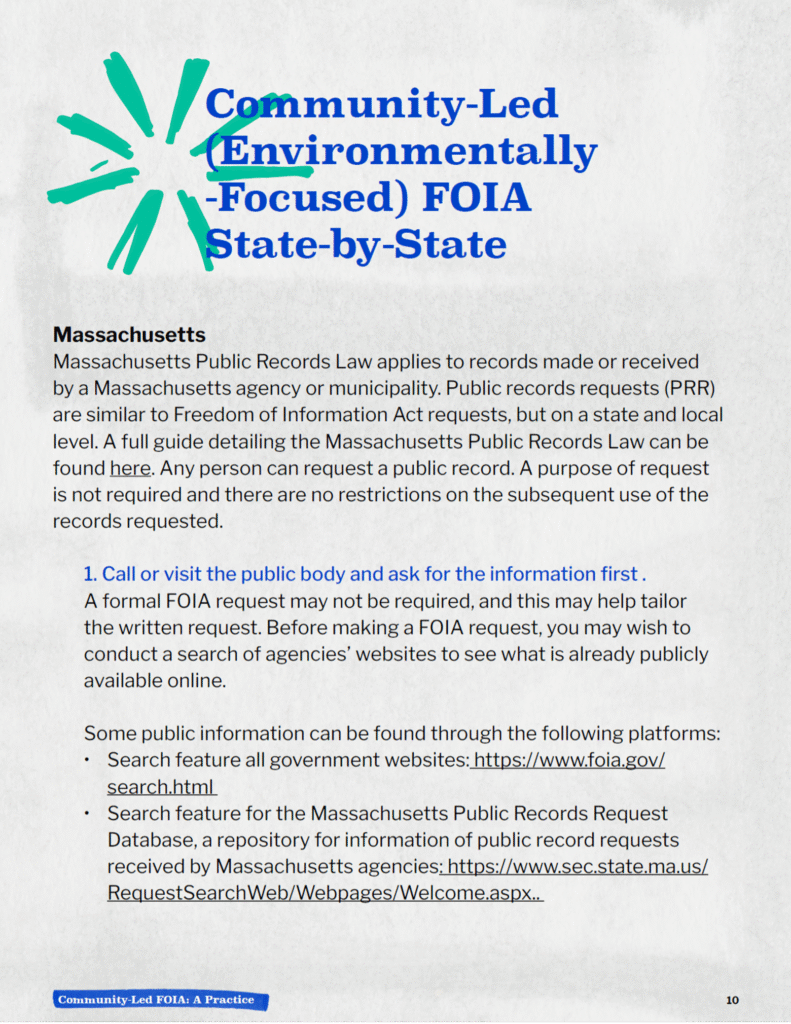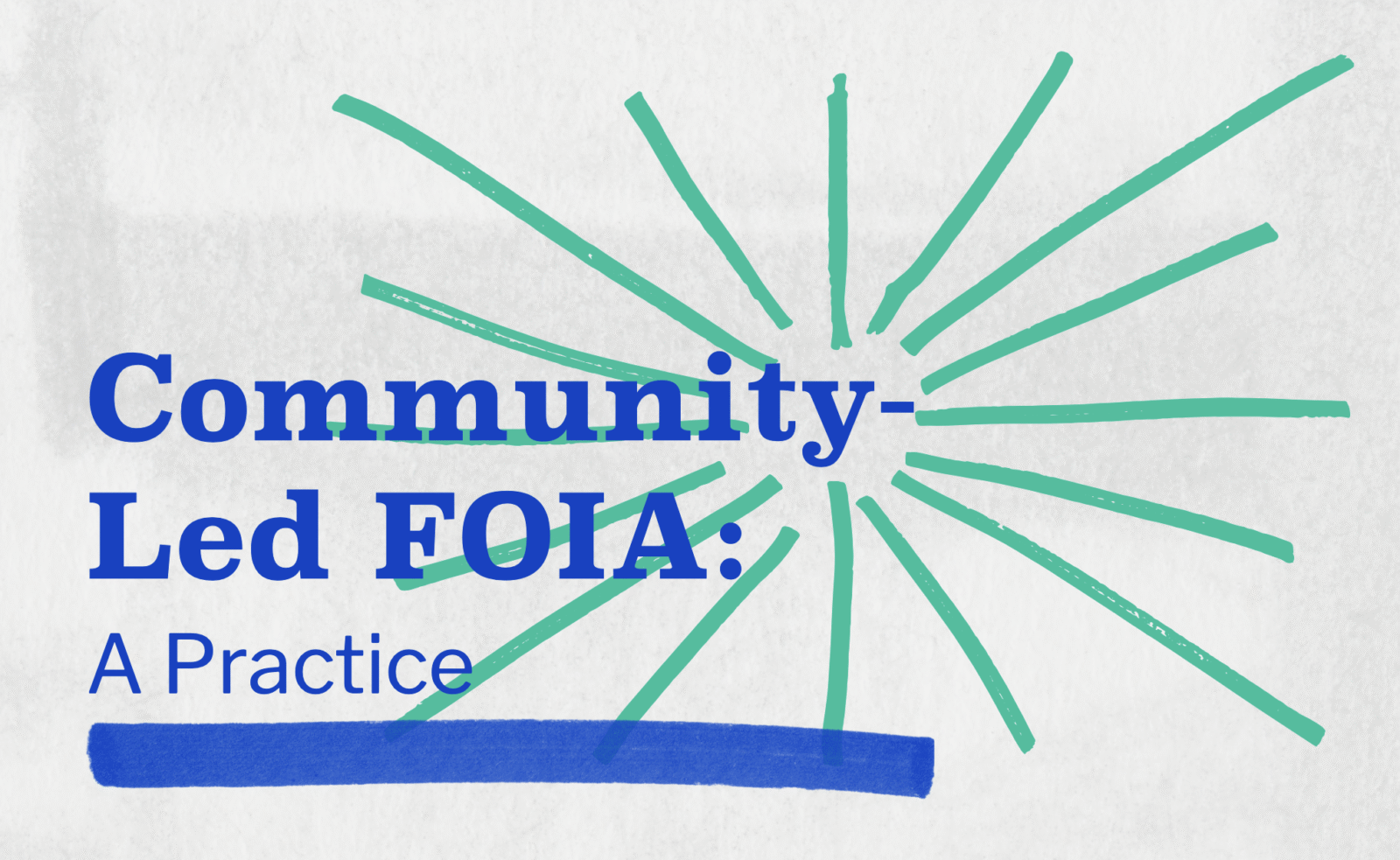By: Gretchen Gehrke, Jessica Varner, Bianca LaPaz, and Amy Xu
What is Community-Led FOIA?
At EDGI, we work to make public information more open and accessible. FOIA is a key tool in this effort. The Freedom of Information Act (FOIA) grants people the right to access public records, helping ensure transparency from government organizations. Through FOIA requests, the public can gather critical information about how their government operates, including specific actions taken and the decision-making process. FOIA helps the public ensure that the U.S. government represents and operates in the interest of the people whose tax dollars pay for governance—citizens and non-citizens alike.
Community-led FOIA is a process developed over the past three years in collaboration with EDGI members and its partners. For more on our NSF-funded pilot project with partner ACAT, see here and here (NSF Project team: Christopher Sellers, Mark Chambers, Jessica Varner, and Gretchen Gehrke). For this Community-led FOIA pilot project, EDGI held an in-person workshop at the SEED Lab in Anchorage, Alaska, in May 2025. During the pilot project, community members asked questions about environmental concerns in their states—legal rulings, military pollution responsibilities, meetings with state partners as federal decisions were made about environmental issues, and more. EDGI members then facilitated document requests with the appropriate agencies to help answer these questions. Community-led processes like this reflect and represent community constituencies’ lived experiences, perspectives, and voices. The method aims to increase transparency and accountability of government agencies to communities. Most importantly, FOIA is a tool accessible to every community.
An essential function of FOIA is to make inaccessible records more accessible to community members impacted by federal environmental governance processes. At a time of significant political turmoil and when environmental governance institutions are changing at a rapid pace, FOIA can help communities uncover how laws and policies are or are not implemented or enforced; about communications between agencies, governmental personnel, and industry representatives; and how scientific findings or questions were or were not included in policy development.
New Tool: State-by-state Community-Led FOIA Guides
Along with partnerships, EDGI is also developing tools to facilitate communities’ use of the FOIA process. Our first tool is a series of state-by-state community-led FOIA guides. Because each state has its own FOIA laws, the process for requesting records varies widely, including who can file a request, how much FOIA requests cost, and how long it might take to receive a response. EDGI’s online state guides provide step-by-step instructions for filing FOIA requests in every state. The guides are designed to assist and empower communities by reducing barriers to obtaining government transparency. All 50 state guides can be viewed and downloaded at A People’s EPA (APE) Community-Led FOIA Resources webpage.
Each guide offers information specific to each state, including:
- freedom of information or “sunshine” and open meetings laws;
- state government transparency platforms for data, legislation, and open meetings;
- state agency directories;
- a sample FOIA request;
- a state-based hotline for additional assistance (if available);
- the estimated response time for a request (if available);
- a list of relevant environmental and natural resource departments for that respective state; and,
- a list of other helpful websites and resources for FOIA.
Example: South Carolina
As an example, see the first page of South Carolina’s Community-Led FOIA Guide, which provides an overview on the FOIA process in South Carolina:

The guides also provide information about other resources helpful in the FOIA process. In South Carolina, for example, the Press Association provides examples and an accessible FOIA hotline. The SC Press Association is a resource for journalists and others submitting FOIA requests to state agencies.
South Carolina law requires an exact timeframe for response, and the guide provides those specifics, as well:
Example: Massachusetts
Massachusetts has a unique FOIA process in which every government agency has a designated official who assists requestors in obtaining public records, called a Records Access Officer (RAO). Each agency also has a public records request portal, making writing and submitting requests easier. In contrast, many states may require email, fax, or mailed copies of a request. See our Massachusetts Community-Led FOIA Guide here.
Massachusetts also has a searchable repository of all previously received public records requests, which allows users to check if their request is required. Not all states have this searchable feature, but each guide provides links to places where community members can check for existing information before creating a FOIA request (when available).

What’s Next for EDGI’s Community-Led FOIA Project
In the posts that follow over the coming months, we’ll review other resources and tools available in the Community-Led FOIA project, discuss the complications of FOIA at the state level with examples, and more. As transparency in environmental data is at risk more than ever in the U.S., we are working to ensure key ways to know more (like FOIA) are accessible to everyone.

